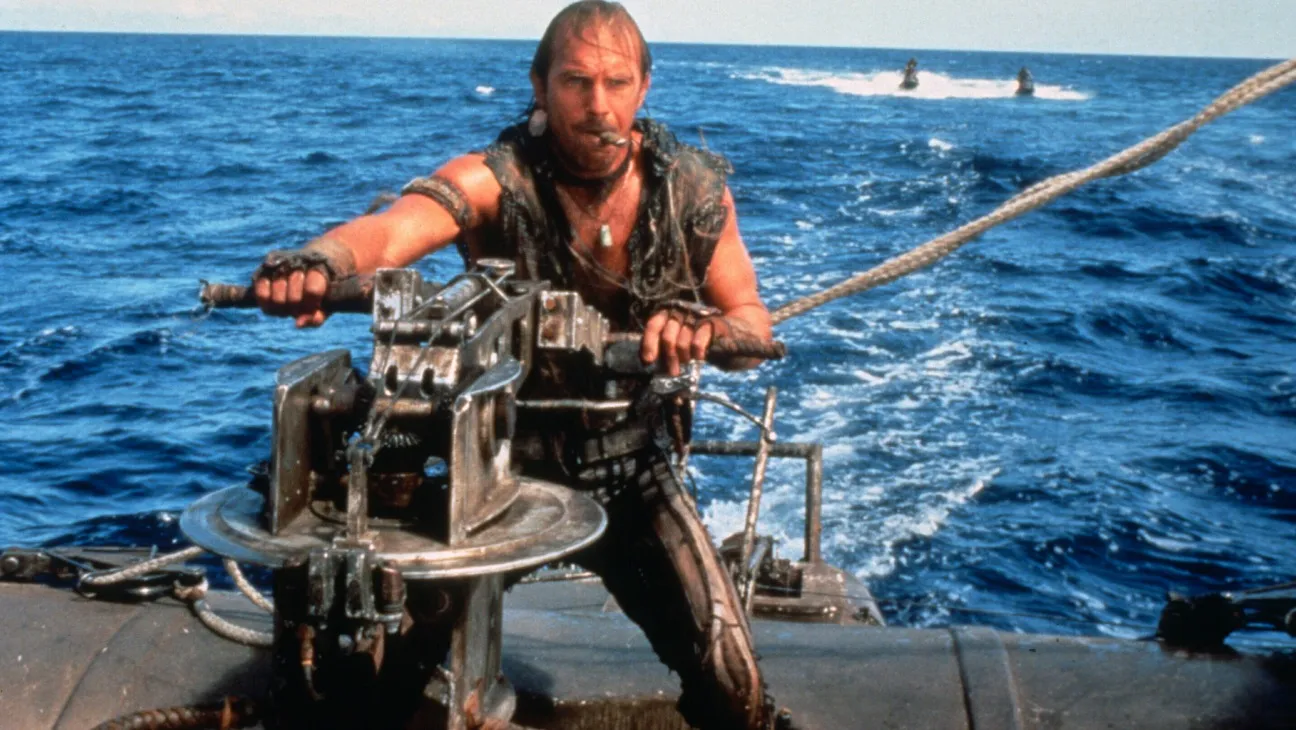🎬 Waterworld (1995)

A Bold and Ambitious Epic: A Review of Waterworld (1995)
Waterworld (1995), directed by Kevin Reynolds and starring Kevin Costner, is a post-apocalyptic action-adventure film that explores a future where the Earth is submerged under water. Known for its massive production budget and unique setting, the film delivers an imaginative narrative filled with daring stunts, captivating visuals, and an environmental cautionary tale. Despite its initial lukewarm reception, Waterworld has since gained a cult following, celebrated for its ambition and creativity.
Plot Overview
Set in a distant future where the polar ice caps have melted, submerging the planet in water, Waterworld follows the Mariner (Kevin Costner), a lone drifter who navigates the endless seas aboard his trimaran. The Mariner’s solitary existence is disrupted when he encounters Helen (Jeanne Tripplehorn) and her adoptive daughter Enola (Tina Majorino), who hold the key to finding Dryland, a mythical place untouched by the ocean.
Pursued by the ruthless Deacon (Dennis Hopper) and his band of Smokers, the trio embarks on a perilous journey to uncover the truth about Enola’s map and the existence of Dryland. Along the way, the Mariner must confront his own humanity and decide whether to embrace connection and hope in a world of chaos.
Kevin Costner as the Mariner
Kevin Costner delivers a stoic and compelling performance as the Mariner, a character defined by his survival instincts and isolation. Costner’s portrayal captures the character’s evolution from a hardened loner to a reluctant hero, adding emotional depth to the film. His physical commitment to the role, including performing many of his own stunts, enhances the authenticity of the action sequences.
Dennis Hopper as the Deacon
Dennis Hopper’s over-the-top performance as the Deacon provides a memorable and entertaining villain. His larger-than-life portrayal injects humor and energy into the story, balancing the film’s darker and more serious moments. Hopper’s Deacon is a classic antagonist, embodying greed and the destructive tendencies of humanity.
Jeanne Tripplehorn and Tina Majorino
Jeanne Tripplehorn’s Helen and Tina Majorino’s Enola bring heart and vulnerability to the narrative. Tripplehorn’s performance as a determined and resourceful woman adds emotional weight to the story, while Majorino’s portrayal of Enola captures innocence and hope in a bleak world. Their dynamic with the Mariner forms the emotional core of the film.
Visuals and World-Building
Waterworld’s production design is one of its standout features, creating a fully realized and immersive post-apocalyptic world. The floating atolls, intricate watercraft, and vast oceanic landscapes convey a sense of both wonder and desolation. The film’s practical effects, including large-scale sets and real water-based shooting, lend authenticity to its visuals, making the world of Waterworld feel tangible and lived-in.
Action and Spectacle
The film excels in its action sequences, featuring thrilling boat chases, aerial stunts, and explosive battles. The climactic confrontation between the Mariner and the Smokers showcases impressive choreography and inventive use of the film’s aquatic setting. These moments highlight the film’s ambition and its commitment to delivering large-scale spectacle.
Themes of Survival and Environmentalism
Waterworld explores themes of survival, adaptation, and humanity’s relationship with the environment. The film serves as a cautionary tale about the consequences of climate change and unchecked resource exploitation. Through the Mariner’s journey, it also emphasizes the importance of connection and hope in overcoming adversity.
Criticism and Limitations
While Waterworld is visually impressive and conceptually ambitious, it faced criticism for its uneven pacing and underdeveloped characters. Some viewers found the tone inconsistent, shifting between serious drama and campy action. Additionally, the film’s production difficulties and ballooning budget overshadowed its release, impacting its initial reception.
Conclusion and Legacy
Waterworld (1995) is a bold and visually striking film that offers a unique take on the post-apocalyptic genre. Kevin Costner’s committed performance, the immersive world-building, and the thrilling action sequences make it a memorable cinematic experience. Despite its flaws, the film’s ambition and creativity have earned it a dedicated fan base and a place in the annals of cult cinema.
For those seeking an epic adventure set in a truly original world, Waterworld delivers a journey unlike any other, reminding us of the resilience of humanity and the enduring power of hope.